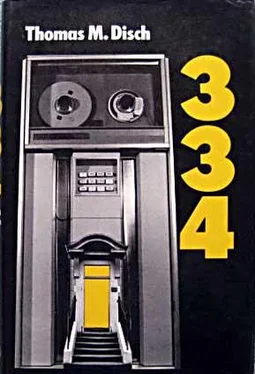“My daughter! Ha!”
“I’m disappointed and—”
“You’re disappointed!”
“Of course I am.”
“Oh. of course, of course!”
He turned away from her. She couldn’t bear it. She would do anything to keep him. “Len!” she called after him.
He returned in no time with his suitcase and his bag of books, moving at the uncanny, hyped-up speed of the five-fifteen puppets.
“Len!” She stretched out a hand, to forgive him, to beg forgiveness. The speed! The terrible speed of it!
She followed him out into the corridor, weeping, wretched afraid. “Len.” she pleaded “look at me.”
He strode ahead heedless, but at the very first step of the stairs his bag swung into the railing and split open. Books spilled out onto the landing.
“I’ll get you another bag.” she said calculating quickly and exactly what might hold him to the spot.
He hesitated.
“Len. please don’t go.” She grasped handfuls of the maroon sweater. “Len, I love you!”
“Sweet fucking Jesus, that’s what I thought!”
He pulled away from her. She thought he was falling down the steps and screamed.
Then there were only the books at her feet. She recognized the fat black textbook and kicked it out through the gap in the rails. Then the rest, some down the steps, others into the abyss of the stairwell. Forever.
The next day when Lottie asked her what had become of the boarder, she said, “He was a vegetarian. He couldn’t live anywhere where there was meat.”
“He should have told you that before he came.”
“Yes,” Mrs. Hanson agreed bitterly. “That’s what I thought.”
26. Messages Are Received (2024)
Financially, being a widow was way ahead of being a wife. Lottie was able to phone Jerry Lighthall and tell her that she didn’t need her job now, or anyone else’s. She was free and then some. Besides the weekly, and now completely reliable, allotment, Bellevue paid her a lump sum settlement of five thousand dollars. With Lottie’s go-ahead the owner of the Abingdon sold what was left of Princess Cass through Buy-Lines for eight hundred and sixty dollars, off the top of which he skimmed no more than was reasonable. Even after paying out a small fortune for the memorial service that no one came to and and wiping up the family’s various existing debts, Lottie had over four thousand dollars to do with as she pleased. Four thousand dollars. Her first reaction was fear. She put the money in a bank and tried to forget about it.
It was several weeks later before she found out, from her daughter, the probable explanation for Juan’s killing himself. Amparo had heard it from Beth Holt who’d pieced it together from scattered remarks of her father’s and what she already knew. Juan had been dealing with resurrectionists for years. Either Bellevue had just found out, which didn’t seem likely, or the Administration had been pressured, for reasons unknown, to pounce on someone: Juan. He’d had time, apparently, to see it coming, and instead of concurring tamely in his sacrifice (it would have amounted to two or three years at most) he’d found this way to go out of the game with honor unblemished. Honor: for years he’d tried to explain to Lottie the intricacies of his private system of reckoning which squares were black and which white and how to move among them, but it had always made about as much sense to her as the engine under Princess Cass’s hood, a man’s world of mathematics—arbitrary, finicking, and lethal.
Emotionally it wasn’t as bad as she’d expected. She cried a lot, but with a bounded grief. Some of Juan’s own affectionate indifference seemed to have rubbed off without her ever realizing. In between the spells of mourning she experienced unaccountable elations. She went for long walks in unfamiliar neighborhoods. Twice she stopped in to visit places where she’d once worked, but she never managed to be more than a source of embarrassment. She increased her evenings with the Universal Friends to two nights a week at the same time that she began to explore in other directions as well.
One day, riding the crest of the highest wave yet, she wandered into Bonwit’s for no other reason that it was right there on 14th and might be a bit cooler than the September concrete. Inside the sight of the racks and counters affected her like a lungful of amyl nitrate on top of morbihanine. The colors, the immense space, the noise overwhelmed her—first with a kind of terror, then with a steadily mounting delight. She’d worked here most of a year without being impressed and the store hadn’t noticeably changed. But now! It was like walking into a gigantic wedding cake in which all the desires of a lifetime had become incarnate, beckoning her to touch and taste and ravish. Her hand reached out to stroke the yielding fabrics—sleek blacks, scratchy russets, grays that caressed like a breeze from the river. She wanted all of it.
She began taking things from the racks and off the counters and putting them in her carryall. How strangely convenient that she should have that at hand today! She went to the second floor for shoes, yellow shoes, red shoes with thick straps, frail shoes of silver net, and to four for a hat. And dresses! Bonwit’s was thronged with dresses of all descriptions, colors, and lengths, like a great host of disembodied spirits waiting to be called down to earth and named. She took dresses.
Descending a step or two from the heights, she realized that people were watching her. Indeed she was being followed about, and not only by the store detective. There was a ring of faces looking at her, as though from a great distance below, as though they yelled “Jump! Jump! Why don’t you jump!” She walked up to a cash cage in the middle of the floor and emptied her purse out into a hamper. A clerk took off the tags and fed them into a register. The sum mounted higher and higher, dazzling, until the clerk asked with heavy sarcasm: “Will that be cash or charge?”
“I’ll pay cash.” she said and waved the brand-new checkbook at his scruffy little beard. When he asked for ID she rummaged among all the scraps and tatters at the bottom of her purse until she found all munched up and bleached her Bonwit’s Employee Identification Card. Leaving the store she tipped her new hat, a big, good-natured floppy tiling dripping with all widths of (because she was a widow) black ribbon, and smiled a big smile for the benefit of Bonwit’s detective, who had followed her every inch of the way from the cash cage.
At home she discovered that the dresses, blouses, and other bodywear were all lightyears too small for her. She gave Shrimp the one dress that still looked life-enhancing in the dark of common day, kept the hat for its sentimental value, and sent back all the rest the next day with Amparo, who already, at age eleven, had the knack of getting what she wanted from people in stores.
Since Lottie had signed the forms to let her transfer to the Lowen School, Amparo had been behaving tolerantly toward her mother. In any case she enjoyed the combat of a refund counter. She wasn’t able to get cash, but she wangled what for her own purpose was better, a credit slip for any department in the store. She spent the rest of the day selecting a back-to-school wardrobe for herself in careful, mezzo-forte taste, hoping that after the explosion her mother, seeing the sense of sending her out into the world dressed in real clothes, would let her keep as much as half of what she’d pirated. Lottie’s explosion was considerable, with screams and a whack or two of the belt, but by the time the late news was over it all seemed to be forgotten, as though Amparo had done nothing worse than to glance in the store’s windows. The same night Lottie cleared out one whole drawer of the dresser for the new clothes. Jesus, Amparo thought, what a superannuated ass!
Читать дальше












